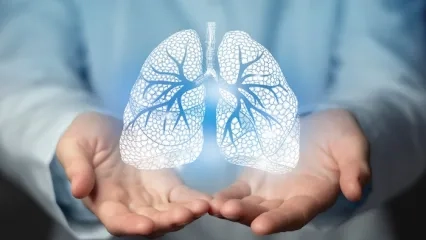Alo Yeditepe
Alo Yeditepe
9 Common Misconceptions About COPD
Although COPD is a problem that affects the world today, patients who are diagnosed are still considered the tip of the iceberg. Chest Diseases Specialist Asst. Prof. Dr. Seha Akduman stated that one of the most important factors that created this situation is that the disease is still not sufficiently recognized. Drawing attention to the fact that despite the increase in awareness on the subject in recent years, there is still some misinformation in the society about the disease, Asst. Prof. Dr. Akduman explained the points to be underlined on the subject…
COPD is Not a Rare Problem!
Stating that contrary to common misconceptions, COPD is the fourth most common disease that causes loss of life all over the world, Yeditepe University Koşuyolu Hospital Chest Disease Specialist Asst. Prof. Dr. Seha Akduman pointed out that 8 years from now, the disease is predicted to rise to third place. Therefore, COPD is not a rare disease.
COPD Does Not Just Affect Smokers!
Pointing out that COPD can also develop in passive exposure, some occupational diseases, or in people who are constantly exposed to dust, smoke, and gas, Asst. Prof. Dr. Seha Akduman: “Yes, COPD can be seen in people who do not smoke. Occupational exposure, genetic diseases, or passive smoking can cause this condition. Additionally, it is a known fact that smoking is effective in the development of COPD. However, 90 percent of people diagnosed with COPD, are smokers.”
COPD is Not Just a Lung Disease
Stating that another misunderstood point about the disease is the perception that COPD only concerns the lungs, Asst. Prof. Dr. Seha Akduman gave the following information on the subject:
“Although COPD may seem like just a lung disease, it affects all systems at the level of oxygen and carbon dioxide, negatively affecting the primary heart and all systems afterward.
Initially, it is seen only as a lung disease in the early stages, but in the following periods, the heart, neurological systems, and whole-body systems are affected by it. In the loss of life, first of all, the heart attack caused by it and the severe pneumonia caused by it cause the loss of life. "
COPD is Not an Obstacle to Doing Sports!
Stating that there is misinformation by the patient and his relatives that the COPD patient cannot and should not exercise, Asst. Prof. Dr. Akduman pointed out that in fact, patients with COPD can also exercise and even do it is necessary and important for the disease. “We have four phases in COPD. In the early stages, shortness of breath or restriction of effort may not be seen. In such early-stage patients, it is recommended to exert and exercise. In the later stages, the patient may not be able to exercise due to shortness of breath. It is recommended that these patients continue their days with daily low-paced exercises."
Asthma and COPD Are Not the Same Thing!
Reminding that asthma and COPD can be confused due to their similarities, Asst. Prof. Dr. Seha Akduman stated that two diseases differ from each other, albeit with small differences: "Asthma and COPD can be seen together in some disease groups. There is even a new disease called Asthma-COPD Overlap Syndrome (ACOs). In some patient groups, both asthma and COPD can be seen together. In fact, people with asthma who smoke may return to COPD after a while. ”
It Can Develop Without Showing Symptoms!
Explaining that the patient's lack of complaints alone would not be enough to exclude COPD, Asst. Prof. Dr. Akduman: “However, it is necessary to decide according to breath measurement tests and physical examination of the patient. One of the most obvious symptoms is shortness of breath, although individual differences appear, we expect it to occur from stage two."
It is Never too Late to Quit Smoking!
Asst. Prof. Dr. Akduman continued as follows: “The most important risk factor for COPD exacerbations and progression of the disease is smoking. Therefore, when COPD is diagnosed, the first thing to do is to quit smoking. Furthermore,
The common risk factor for lung cancer and COPD is smoking. Therefore, the incidence of lung cancer has increased in patients with COPD.
The Disease is Also Closely Related to Nutrition
Stating that there is also a wrong idea that nutrition will not be relevant in this problem that concerns the lungs, Yeditepe University Koşuyolu Hospital Chest Diseases Specialist Asst. Prof. Dr. Seha Akduman: “Today, we know that salt consumption, unhealthy processed food consumption, and eating low in antioxidants are risk factors for COPD. High salt consumption can cause COPD. Along with smoking, high-salt diets bring us one step closer to COPD.”
“COPD is a Preventable and Treatable Disease”
Underlining that COPD is a preventable and treatable disease, Asst. Prof. Dr. Seha Akduman stated that even if there are irreversible changes in COPD, the most important purpose of treatment is to ensure that lung capacity is maintained and to prevent the progression of the disease. “It is very important that patients and their relatives know that the progression of the disease can be prevented. The progression of COPD can be prevented by quitting smoking, using drugs properly, not interrupting vaccines, and preventing lower respiratory tract infections.”
Reminding that emphysema is an irreversible lung disease and therefore the main purpose of COPD treatment is only to prevent the progression of the disease, Asst. Prof. Dr. Seha Akduman continued: “However, the damage that has occurred so far is irreversible. However, after the onset of emphysema or COPD, the patient continues to experience loss of lung function every year with the effect of age. If the disease is not under control, the loss of lung volume and function will be at a higher level.”
Press Coverage: cumhuriyet | oncevatan | cnnturk
About
Faculty and Year of Graduation:
Gazi University Faculty of Medicine, 2007
”
See Also
- How to Cleanse Your Lungs?
- Is Breathing Air Dangerous in Fires?
- What is Electronic Cigarette Disease (EVALI)? EVALI Symptoms and Treatment
- What is COPD? Symptoms and Treatment of COPD
- Long Journeys Increase the Risk of Embolism!
- What Asthma and COPD Patients Should Pay Attention to When Using Air Conditioning!
- What is Allergy? What are the Symptoms of Allergy?
- What is Desert Dust? Harms of Desert Dust
- Lung Cancer Screening Age
- What is Good for Cough? How to Cure Cough?
- Lung Cancer Symptoms and Treatment
- 10 Ways to Have a Sound Sleep in the Heat
- What Should Asthma Patients Be Cautious About?
- Does Poor Quality Sleep Increase The Risk of Asthma?
- What Causes Insomnia, Diagnosis and Treatment
- Causes, Symptoms, and Treatment of Asthma
- Allergy and Asthma During Pregnancy
- It Is Aimed to Eliminate Tuberculosis Worldwide By 2030
- Lung Patients Should Not Stop Their Medications
- 4 Significant Preliminary Symptoms of Lung Cancer
- How Does Acid Rain Affect Human Health?
- The Slowing Traffic in Istanbul Increases the Risk of Cancer!
- The American Cancer Society Has Announced; The Age of Screening For Lung Cancer Has Decreased
- Hidden Lung Cancer Cases Revealed in Tomographs Taken Due to Coronavirus
- Obesity is Both a Cause and Consequence of Sleep Apnea
- Asthma and COPD Attack Season Begins
- Lung Cancer
- Snoring and Its Treatment
- Using Antipyretics Uncontrolled Can Hide Pneumonia Symptoms
Alo Yeditepe




